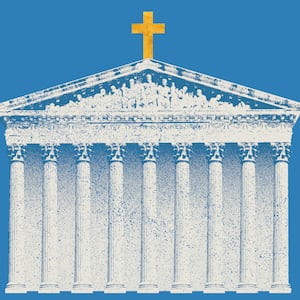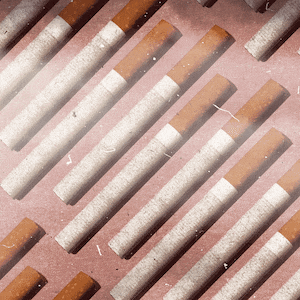COVID-19 could end up taking down two presidents—the one who was grossly incompetent, and the one who expected to ride a vaccine to victory over the coronavirus.
In other words, Donald Trump might very well have been re-elected if he had handled COVID responsibly. And while Joe Biden’s been an improvement, the perception of his management of the pandemic isn’t great, and that could be his undoing.
A New York Times analysis of Biden’s decline in the polls from the mid-50s to his current 42 percent reveals that the downward pressure started well before the messy August 2021 exit from Afghanistan took its toll. The slippage in Biden’s numbers, in fact, coincided with the rise of the more transmissible Delta variant and with it, a growing awareness among the public that the administration’s cheery declaration of a post-vaccine “summer of freedom” had turned into something quite different.
Biden’s Independence Day celebration was “the domestic equivalent of Mission Accomplished,” says Jack Pitney, a professor of politics at Claremont-McKenna College, recalling George W. Bush’s premature declaration of victory in Iraq.
The president had invited thousands to the South Lawn of the White House to celebrate America’s “independence” from the virus, 16 months after the World Health Organization declared a pandemic, and after more than 605,000 Americans died.
Now, less than a year later, a million people and counting have died from the virus. The grief, anger, and despair—plus the political fights over vaccines and mask wearing and school closures—have dragged down Biden’s popularity in ways he couldn’t have foreseen when he invited all those unmasked celebrants to the White House last year on July 4.
Many analysts pegged the start of Biden’s descent in the polls from around the time when U.S. troops left Afghanistan with little to show for twenty years of war. Images of desperate Afghans left to the mercy of the Taliban filled television screens. Thirteen U.S. service members lost their lives in an explosion at Kabul’s airport that everyone saw—with gruesome images widely available on TV and the internet.
But Biden’s job approval actually started to fall a full five weeks before those dispiriting scenes.
“Afghanistan deepened and accelerated the fall,” says Bill Galston, a senior scholar in governance studies at the Brookings Institution. Even though voters backed the decision to end U.S. involvement, the messy exit undermined voter confidence in Biden as a steady, competent hand—which along with his decades of experience as a D.C. dealmaker, was a primary selling point of his candidacy.
Biden believed that getting COVID right would demonstrate that the government could work, and that democracy could deliver. A life-saving vaccine was the answer to mitigating death and serious illness from the coronavirus, but the president oversold it as the promised land. When the virus continued to surge, he then got the blame—even though millions of people inexplicably refused to get vaccinated. It was a no-win situation for the president, and now the Senate is stalling on funds to deal with an expected surge of the virus in the fall.
But it wasn’t always this way. Biden initially got high marks on his handling of COVID. “Two hundred twenty million shots in people’s arms,” says Matt Bennett with Third Way, a moderate Democratic group. “He wasn’t doing and saying crazy things,” but Bennett adds, “He didn’t ride it to the victory he thought it would be” in part because of confused messaging and vaccine denialism.
Some of the confusion was understandable, given COVID is a “novel” virus that continues to evolve and pose different threats. The public wanted clear information and more certainty, and the administration had trouble getting its act together. “They needed a consistent message, and they didn’t have it,” says Pitney.
An Axios-Ipsos poll found confidence in Biden’s ability to rescue the economy from COVID had tumbled from 52 percent in January 2021 to 44 percent in October 2021. Biden’s messaging is “focused on the wrong problem” from a confidence-building perspective, said Cliff Young, president of Ipsos U.S. Public Affairs. “The problem is not the unvaccinated. The problem is convincing those who are vaccinated that they have the tools to navigate a COVID world...[and reassuring] those who’ve been vaccinated that they can live a normal life again.”
All the to-ing and fro-ing over whether schools should be open, and what exactly does it mean “to follow the science” left people with more questions than answers.
“People are confused,” Young said. “There's no sense of what the endgame is.”
The CDC added to the confusion with exquisitely nuanced guidelines that changed often—which seemed to many people as arbitrary and unscientific. “There's this huge mushiness about who's protected, how much they're protected,” said Ipsos pollster and senior vice president Chris Jackson.
In January of this year, the CDC updated its “isolation guidance.” The agency didn’t recommend a rapid test after five days of quarantine, but said if you take one and it’s positive, isolated people should continue isolating for five more days. Those who leave isolation were urged not to fly on planes or eat in restaurants.
It’s all on the honor system. No wonder people on planes cheered when a Trump-appointed federal judge ended the mask mandate on planes before Biden got around to it.
Parents of the young children are still waiting for a vaccine that’s been weeks away for months, and the administration is warning they may have to ration booster shots in the fall if Congress doesn’t come through with more money. The race to find home testing kits reached a crescendo before the holidays last year when they became harder to find than the latest kid’s toy.
In an exchange at the White House briefing in early December, NPR’s Mara Liasson asked Biden’s then-press secretary Jen Psaki, “Why not just make ’em free and give ’em out, make them available everywhere?”
Psaki replied in a notably sarcastic tone, “Should we just send one to every American?”
Soon after that exchange, which generated a storm of outrage from a frustrated public, the administration announced that 500 million tests would be available in early January, free and mailed to every American. By then, the holidays were over, and it was too late to generate any goodwill for the administration’s belated action.
“It’s also true that he is getting higher ratings for his handling of the virus than for any of his other responsibilities,” says Galston. It’s the only area in which Biden polls above 50 percent. At the same time, concern about the pandemic has dropped down the list of voter priorities, below inflation and the economy, while abortion has moved up sharply because of a looming SCOTUS decision that will almost certainly overturn Roe v. Wade and with it, a women’s federally guaranteed right to choose.
“If we don’t have any major surges, [COVID] won’t be much of a factor in the midterms, but the general dissatisfaction will linger into 2024,” says Pitney. The cloud of COVID contributes to the sour mood of voters, as evidenced in an NBC poll released this week showing 75 percent of Americans think the country is “off on the wrong track.”
“It’s the midterm slide,” says Pitney, who points out other presidents have “looked like goners” at this same point, and they and their party rallied. “These are tough problems to solve as they would be for any president. Real disposable income is down and until inflation eases and that turns around, there’s not much Biden can do except say the Rosary a lot.”
My initial inclination on Biden’s handling of the pandemic was to cut the president some slack. He’s so much better than Trump, and he’s got crises up the kazoo.
But when he said this week that he’s not a “mind reader” and that’s why his administration didn’t head off a shortage of baby formula, that was pretty lame. Public health emergencies are not about mind reading, they’re about recognizing the failures and getting staffed up so they’re not repeated. If the Republicans win control of the House in the November midterms, we’ll hear a lot more about what Biden got wrong. He should beat them at their own game by admitting his mistakes and framing them as valuable lessons learned from a pandemic.








